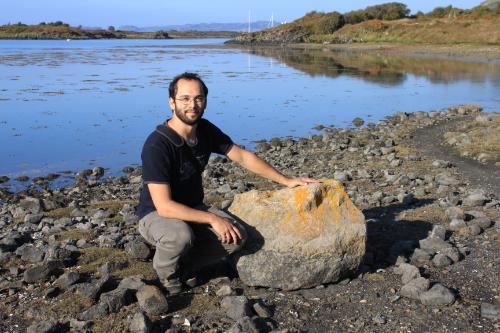Dr Riccardo Arosio
Biography
 Riccardo is a marine geologist with a M.Sc. from the University of Western Australia and a Ph.D. from the University of Aberdeen (UK). Before becoming a Post-Doc researcher at UCC he has been a Senior Marine Scientist at the Centre for Environment, Fisheries and Aquaculture Science (CEFAS) in the United Kingdom, where he was involved in the habitat mapping and seabed/coastal monitoring work for the UK Marine Protected Areas Monitoring (MPA) programme, the Commonwealth Marine Economies (CME) programme and the British Energy Estuarine and Marine Studies (BEEMS) programme. He now works as a postdoctural researcher on the NoMans_TIF project.
Riccardo is a marine geologist with a M.Sc. from the University of Western Australia and a Ph.D. from the University of Aberdeen (UK). Before becoming a Post-Doc researcher at UCC he has been a Senior Marine Scientist at the Centre for Environment, Fisheries and Aquaculture Science (CEFAS) in the United Kingdom, where he was involved in the habitat mapping and seabed/coastal monitoring work for the UK Marine Protected Areas Monitoring (MPA) programme, the Commonwealth Marine Economies (CME) programme and the British Energy Estuarine and Marine Studies (BEEMS) programme. He now works as a postdoctural researcher on the NoMans_TIF project.
Research Interests
Riccardo’s main research interests are fundamentally marine and Quaternary geology, he enjoys deciphering the sparse evidence left by past events and to reconstruct ancient landscapes, utilising different tools from geomorphology to geochemistry. However, at CEFAS he has come to greatly appreciate the importance of geology and geomorphology to better understand modern marine ecosystems and has collaborated closely with ecologists and hydrographers to link disciplines and create map products that can have an impact and influence policy makers. Riccardo has also been trying to tackle the problem of mapping scales and reproducibility – especially at the level of geomorphology, and the creation of sets of rules that can describe objectively seabed features. This has led him to collaborate actively with the Mareano-Infomar-Maremap (MIM) group and to start the Post-Doc position as UCC on the NoMans_TIF project.
Publications
Arosio, R., Gafeira, J., De Clippele L.H., Wheeler, A.J., Huvenne, V.A.I., Sacchetti, F., Conti, L.A. and A. Lim, 2024. CoMMa Toolbox: a GIS geomorphometry instrument to map and measure confined landforms. Geomorphology, 458, 109227. doi.org/10.1016/j.geomorph.2024.109227
Arosio, R., Wheeler, A.J., Sacchetti, F., Guinan, J., Benetti, S., O’Keeffe, E., Van Landeghem, K.J.J., Conti, L.A., Furey, T., and A. Lim, 2023. The geomorphology of Ireland’s continental shelf, Journal of Maps, 19, 1, 2283192 https://doi.org/10.1080/17445647.2023.2283192
Arosio, R., Hobley, B., Wheeler, A. J., Sacchetti, F., Conti, L. A., Furey, T. and A. Lim, 2023. Fully convolutional neural networks applied to large-scale marine morphology mapping. Frontiers in Marine Science, Sec. Ocean Observation, 10, https://doi.org/10.3389/fmars.2023.1228867
Nanson, R., Arosio, R., Gafeira, J., McNeil, M., Dove, D., Bjarnadóttir, L.R., Dolan, M.F.J.; Guinan, J., Post, A., Webb, J. and Nichol, S., 2023 (April 14). A two-part seabed geomorphology classification scheme (v.2); Part 2: geomorphology framework and glossary. Zenodo. DOI: 10.5281/zenodo.7804019
Michel, G., Coughlan, M., Arosio, R., Emery, A.R. and A.J. Wheeler, 2023. Stratigraphic and palaeo-geomorphological evidence for the glacial-deglacial history of the last British-Irish Ice Sheet in the north-western Irish Sea, Quaternary Science Reviews, https://doi.org/10.1016/j.quascirev.2022.107909.
Arosio, R., Collier, J., Hawes, J., Gupta, S. and Sperry, J., 2021. New perspectives on the English Channel megaflood hypothesis: high resolution data and the investigation of macro- to micro-scale geomorphological features. Geomorphology, 382 pp. 107692
Dove, D., Nanson, R., Bjarnadóttir, L.R., Guinan, J., Gafeira, J., Post, A., Dolan, M.F.J., Stewart, H., Arosio, R. and Scott, G., 2020 (October 7). A two-part seabed geomorphology classification scheme (v.2); Part 1: morphology features glossary. Zenodo. http://doi.org/10.5281/zenodo.4075248
Butschek, F., Arosio, R., Austin, W.E.N., Noormets, R. and Howe, J.A., 2019. Late Weichselian glacial history of Forlandsundet, western Svalbard: an inter-ice-stream setting. Arktos, 5, pp 1–14
